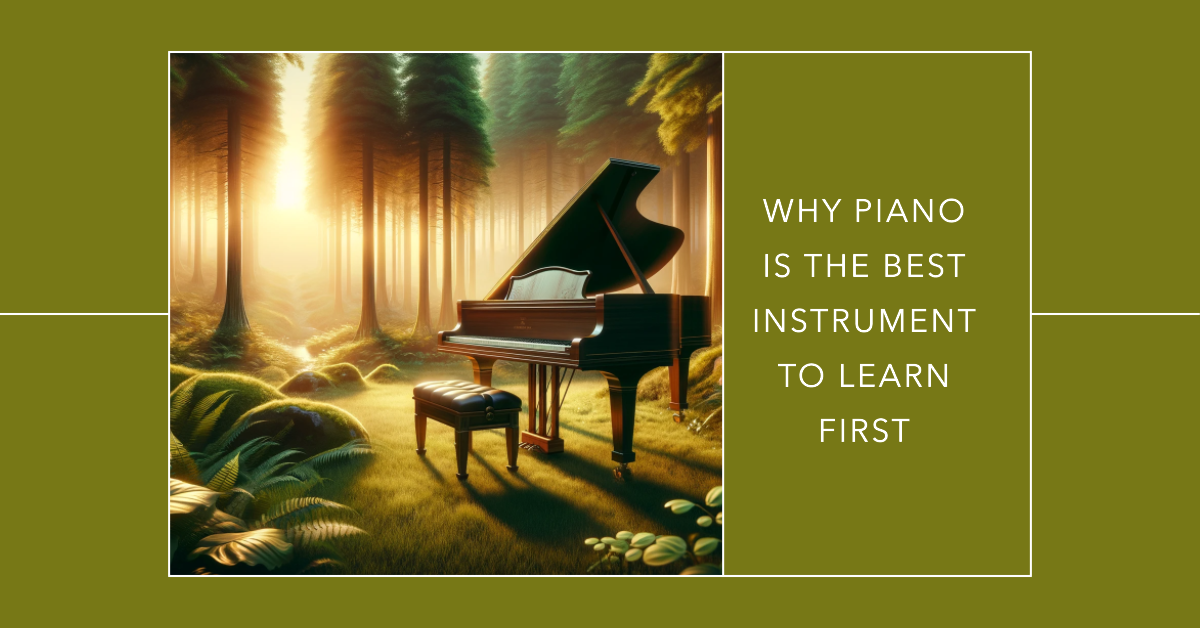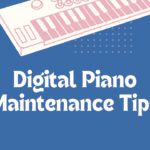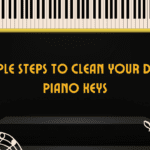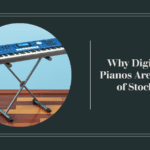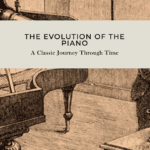Learning to play a musical instrument can be one of the most rewarding and enjoyable experiences in life. Not only does it provide a creative outlet, but it also builds discipline, boosts brain health, reduces stress, and simply brings more beauty into the world.
Of all the instruments to choose from, the piano stands out as the best option for beginners of any age to start their musical journey. With its simple and intuitive keyboard, immediate pleasant sound, and strong foundation in music theory, the piano equips new players with skills that apply to almost any instrument while allowing them to access a huge variety of musical styles.
Beyond being a superb launchpad for musical mastery, learning piano also confers many additional benefits beyond music itself – from improving memory and coordination to building patience and self-confidence. And not least of all, tickling the ivories provides a lifetime of relaxation and joy.
The Piano’s Simple and Intuitive Layout Accelerates Learning

Unlike many instruments, the piano allows you to produce clear, recognizable music with very little instruction. Notes are arranged in a logical sequence from low to high, with the black and white keys representing the 12 chromatic pitches of Western music. Beginners can visualize and understand intervallic relationships between notes as they are laid out spatially on the keyboard.
The piano also facilitates playing harmony in addition to melody. While most instruments can only produce one note at a time, the piano keyboard enables you to play chords and basslines simultaneously with a melody. This allows an integrated understanding of how chords are built and how harmony works from the very first lessons.
Overall, the intuitive and methodical layout of the piano makes abstract concepts like scales, chords, and time signatures easier to grasp. Students can see these elements plainly in front of them, accelerating their comprehension of music theory.
Pleasant Sound from Day One

Another advantage of starting on piano is that it sounds good right away, even when played by complete beginners. Unlike woodwind and brass instruments, producing clear notes on the piano does not require complex breath control or specific finger positions. Simply press a key, and a tuned tone rings out.
This allows new pianists the chance to enjoy making music from their very first lessons, rather than struggling with technique for months on end. The piano also has an exceptionally wide tonal range spanning over seven octaves on a standard keyboard. This versatility enables nuanced dynamic and emotional expression, rather than just producing a series of notes.
The satisfaction gained from creating pleasant-sounding pieces early on, combined with the potential for emotive playing, provides strong motivation for piano students to practice regularly and progress quickly. The good news is that hard work pays off exceptionally fast on the piano, with noticeable weekly improvements in dexterity, reading ability, and musicality.
Music Theory Comes Naturally

Learning the basics of music theory and reading notation is arguably simpler on piano than any other instrument. The spatial layout of the notes on the keyboard directly corresponds to the lines and spaces of the musical staff. This makes visualizing notes on a page much easier, as piano students can simply match the position of musical symbols to the keys.
For example, when seeing an E note written on the musical staff, a pianist can instantly pinpoint and play the corresponding E key next to the middle C. This fundamental connection between page and keyboard accelerates the ability to sight-read music. In contrast, string and wind players must mentally translate notes into unfamiliar finger positions.
Understanding musical intervals and chords is also greatly facilitated by the linear nature of the piano keyboard. Octaves clearly repeat from left to right, while common chords group together in easily recognizable hand positions. The concepts of music theory come alive and make intuitive sense when applied to the piano.
Unmatched Versatility and Variety

Another major advantage of learning piano before other instruments is that it can credibly play almost any style of music. From classical to jazz to pop to electronic, the piano has a place across virtually every genre. This versatility enables new pianists to not only play the classics from Bach and Beethoven but also tap into contemporary styles that inspire them.
No other instrument offers such diversity right from the first lessons. A new violin student, for example, would likely be stuck playing classical and baroque pieces for quite some time before branching out into other styles. Piano is unique in allowing complete beginners to access a huge variety of musical genres.
This versatility also extends to ensemble playing. As a solo instrument, piano provides complete musical experiences and even full orchestral textures. But it also blends seamlessly into guitar/vocal pop combos, jazz trios, musical theater pits, salsa bands, and even large symphony orchestras as a featured solo instrument.
Such flexibility means aspiring pianists can join fellow players in a multitude of group settings. No matter your musical taste or preferred ensemble size, piano has a role. This expands opportunities for young players to participate in bands, orchestras, and other student groups, which multiplies enjoyment while further accelerating their progress.
Benefits Beyond Music Itself

While mastering an instrument is inherently rewarding, playing piano, in particular, imparts many additional benefits beyond the music itself. The coordination required to play smoothly trains the brain and improves manual dexterity. Sight reading forces mental focus and pattern recognition. Memorizing pieces builds systemic thinking as both sides of the brain activate to link motor movements with auditory processing.
Scientific research shows that playing piano improves the speed and accuracy of cognitive processing while enlarging gray matter volume in regions related to motor control, visualization, and hearing. Neural networks become more efficient and adaptable, benefitting the brain well beyond musical tasks alone.
Learning piano has also been repeatedly linked with improved academic performance in areas such as literacy, numeracy, and STEM subjects. The multifaceted nature of decoding musical notation, understanding rhythm, and linking written symbols with motor output appears to strengthen students’ mental flexibility, focus, and memory retention.
On top of the intellectual benefits, playing piano is a proven stress reliever, which supports mental health. Entering a state of creative flow releases feel-good neurotransmitters like serotonin and dopamine while lowering levels of the stress hormone cortisol. The act of making music, especially when shared, is a powerful mind-body regulator.
Finally, the process of progressing from beginner fumblings to mastery over years of practice teaches patience, discipline, resilience, and confidence. Learning an instrument builds character by requiring consistent hard work to achieve small incremental gains that eventually compound. This instills essential life skills that apply far beyond the piano bench.
Addressing Common Concerns
While the piano clearly provides an array of advantages as the best first instrument, there are a few common concerns that give some prospective students pause:
Cost and Size
Pianos represent a major investment, often ranging from a few thousand dollars up to six figures for high-end grand pianos. Then there is the need to accommodate their large footprint within a home. These factors understandably deter some families from choosing piano as their child’s first instrument.
However, quality digital pianos and keyboards provide very realistic weighted actions for a fraction of an acoustic piano’s cost. And thanks to technology like headphones, even apartment dwellers can enjoy playing without disturbing the neighbours. With digital instruments, piano is open to all budgets and living spaces.
Used acoustic upright pianos can also often be found at affordable prices from private sellers looking to free up room. And many music schools have practice rooms available with pianos to supplement at-home playing. Students need not necessarily have a piano at home to start lessons and progress.
Lastly, framing piano expenses as an investment changes the equation. Unlike most instruments that are outgrown and discarded, quality pianos literally last lifetimes and tend to appreciate in value. And the musical skill acquired while learning piano applies to any other instrument if a student ultimately switches focus.
Physical Limitations
Another barrier for some is the perception that piano playing requires exceptional natural abilities like long fingers, big hands, or high flexibility. In fact, people of all ages, body types, and physical conditions can play beautifully. Small children start lessons successfully every day, and even senior citizens commonly take up piano as retirees.
For those with specific conditions limiting range of motion, adaptive technologies like one-handed keyboards allow full musical expression. Innovations in digital instruments provide customized solutions to accommodate nearly any physical situation. With a good teacher selecting appropriate repertoire and techniques, piano can work for anyone.
Conclusion: Start Here
In summary, as the best first instrument for beginners to learn, piano uniquely combines these advantages:
- Simple, intuitive layout to visualize music theory
- Pleasant sound production from day one
- Foundational training in notation reading
- Unparalleled versatility across musical genres
- Ensemble opportunities from solos to orchestras
- Lifelong intellectual and mental health benefits
- Character building through disciplined practice
For children displaying early musical interest or adults finally indulging long-held desires to play, piano is the ideal starting point. From the very first lessons, the piano enables success, enjoyment, and progress across an unlimited breadth of musical styles.
Learning piano unlocks an entire world, seeding a lifetime appreciation for music itself while developing transferable skills. The piano makes musicianship accessible to all by meeting students where they are. There is no need to read music beforehand or possess any prerequisite technique.
Perhaps most importantly, piano playing brings joy both to those creating sounds and the fortunate audiences that get to hear. Music speaks directly to our emotions, bringing people together through a universal language. Our world desperately needs more of that communal beauty.
So for any prospective musicians eager to get started, the choice is clear. Let the piano be your gateway to musical expression and enjoyment. Discover the instrument allowing you to translate what you feel into organized sound that moves others. Let your creativity sing!
Taking the First Step
Convinced piano is the right place to start your musical journey? Luckily, getting started is simple no matter your age or location:
- Find a teacher – The best way to learn good technique and reading skills is taking weekly lessons from a qualified piano teacher, either locally or remotely via video chat. Music schools, community centers, local bulletin boards, and online marketplaces like TakeLessons.com make connecting with the perfect teacher for your needs easy.
- Establish a practice routine – Consistent daily practice is essential to progress quickly. Set a regular time to sit down and run through lessons, pieces, exercises, and drills. Apps like TonalEnergy and Yousician gamify learning to stay motivated.
- Get method books – Essential series like Alfred’s Basic Adult Piano Course, Bastien Piano Basics, and Faber Piano Adventures provide structured curriculums of technique, theory, and repertoire. Supplement with fun songbooks once skills develop.
- Enjoy piano online – In addition to formal lessons, YouTube channels like Hoffman Academy and Pianote offer a wealth of free tutorials, lessons, and inspiration to immerse yourself in piano learning. Their structured courses allow guided independent study between working with a teacher.
The doors to musicianship are open to piano students of all ages and ambition levels, from basic leisurely playing to intense virtuosity. But it all starts with the first lessons and those initial notes ringing out. Strike the keyboard and unlock a universe of creative possibility! Let the music play on.

